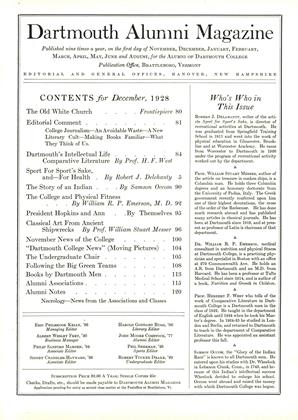Finding the dominant note of the month just past for the undergraduate is not quite so easy as it appears. A glance at the Memorial Stadium these Saturday afternoons would suggest to a casual observer that the college undergraduate is an animal who watches football games. That, so every undergraduate believes, along with Delta Alpha and fraternity initiations is what the average alumnus remembers of the life of college. But as a matter of fact the college student has had his mind on coming hour exams and monthly papers, for the past month during many more of his waking hours than he has devoted to watching the athletes perform. Hour exams with the following mid-semester reports of men "down" in various subjects is what one hears talked over in the dormitory conversation or in College Hall living room after freshmen have come out of Commons.
Not a great deal can be said about the examinations this year, since they are all different, and no undergraduate can judge them from more than a few years' experience. Doubtless they call for fewer facts and more organized thinking than the examinations of ten years ago. The Professors expect or better—want—to see conclusions drawn from facts given out in the lectures rather than the facts themselves. Where possible they are trying to use the lecture system as something more than "a method whereby information is transferred from the lecturer's notebook to the student's notebook with the mind of neither being called into operation."
Opportunity for individual effort in "going after" an education is being offered more and more. "Vagabondia," a department of TheDartmouth, listing interesting lectures for those who wish to do more than is absolutely required, is used by an ambitious few. At least one major department is posting announcements of lectures which would be of interest to the honor students, of whom no attendance is required, but who are expected to avail themselves of the opportunity to get information and ideas from likely sources in the classrooms. The honors system, by the way, is, after a tardy start, being heard of more frequently. The technique, an understanding of the possibilities of work with superior students, and the extra teaching force required, gradually are coming to the College.
The vocational work of the College is always worth looking at. Since vocational guidance is such an elementary science, if science it be at, all criticism of the work is generally rife. The easiest and most worthwhile thing personnel men in the colleges can do is give information about the professions and various occupations men go into from college. That work is being done admirably by the College this year in the Biography course lectures. This last month Howard Coonley, president of the Walworth Company of Boston, spoke on "The Ideals, Opportunities, and Difficulties of the Mercantile Career" and Harvey Cushing did the same for the career of medicine. During December, John Haynes Holmes, of the Community Church of New York City, and Newton D. Baker, former Secretary of War, will speak on thfe ministry and the legal profession respectively. But enough of such stuff as "opportunities for education."
What does the present undergraduate crossing the town Commons to class look like now? He is of course from the "suburbs" rather than from Connecticut valley towns or villages. He has money enough to spend for trips to the city for the movies and for clothes. While at College he rarely wears a suit, and the heavy green sweaters of five years ago and the rough corduroys of even three years ago are on the wane. Knickers, pale green, lightweight sweaters and loud scarlet or blue ski-jackets remind one of the home town golf club with the winter sports attractions in January. But the student is still a good boy at heart despite his less dirty and therefore less masculine clothes.
One thing which is surprising to the freshman who heard from the home town alumnus about the little New England college in the hills is the absence of Yankee atmosphere around Hanover. The big brick buildings are taking the sites of little white clapboard houses which have been moved to Balch Road east of the College Park or to North Main Street. The only people who still speak Yankee in town are the janitors and store keepers. The inhabitants of Lebanon or White River Junction are quite as likely to be named Duffy or Labombard as Chase or Adams.
 View Full Issue
View Full Issue
More From This Issue
-
 Article
ArticleAlumni Associations
December 1928 -
 Sports
SportsSport for Sport's Sake, and—for Health
December 1928 By Robert J. Delahanty -
 Lettter from the Editor
Lettter from the EditorEditorial Comment
December 1928 -
 Article
ArticleClassical Art From Ancient Shipwrecks
December 1928 By Professor William Stuart Messer -
 Article
ArticleThe College and Physical Fitness
December 1928 By William R.P.Emerson, M.D. -
 Class Notes
Class NotesCLASS OF 1921
December 1928 By Herrick Brown







